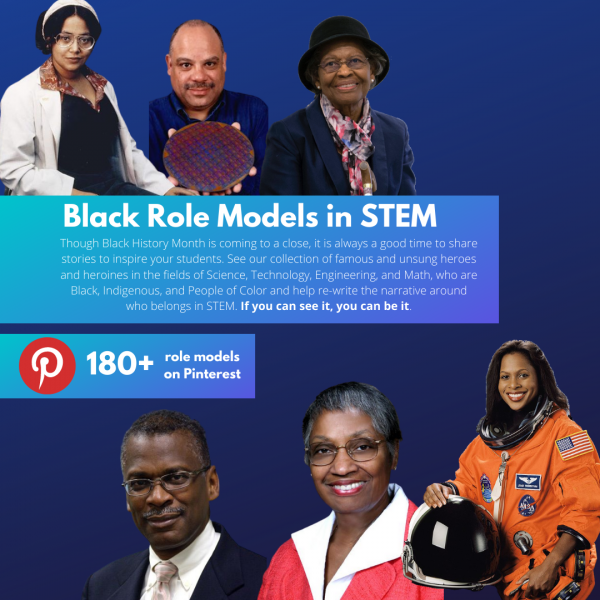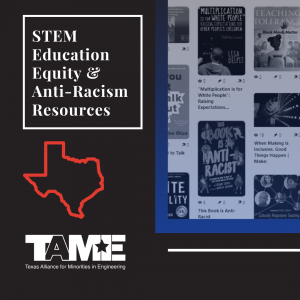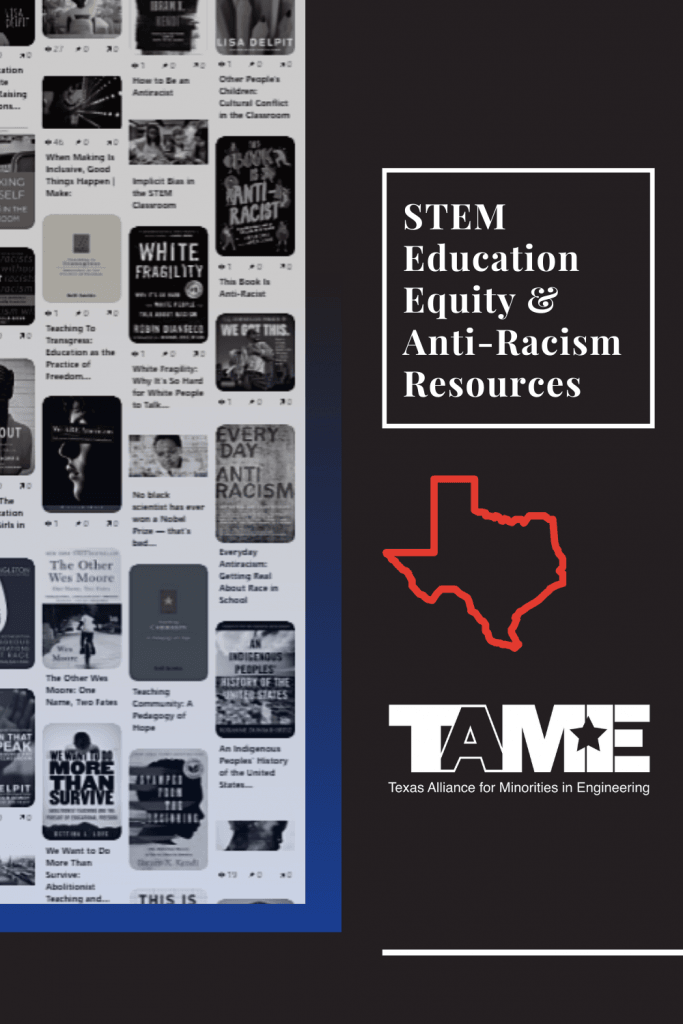In June 2020, TAME recommitted to the work addressing systemic and structural racism, acknowledging that social justice is at the core of STEM equity. Our responsibility to the students we serve requires us to look within our network and team and have courageous conversations to inform our work.
Join us! Check out our Pinterest board below to find books, articles, and more to address anti-racism and equity in STEM education. See anything we missed? The TAME Staff are committed to the ongoing dialogue and invite the TAME Family to share insight here: tame.org/survey
We keep this blog post updated on a continual basis as new resources become available. [Last updated May 2021.]
Top recommended anti-racism resources
- Learning for Justice (formerly Teaching Tolerance) – One of the leading resources for anti-racism work in schools and classrooms, offering free lesson plans, teaching strategies, film kits for online streaming, an extensive archive of magazine articles on educational equity, plus professional development in workshops, self-guided learning, podcasts, webinars, and more.
- Courageous Conversations – A best-selling field guide for achieving equity in schools, plus the Courageous Conversation Academy with in-depth virtual courses dedicated to systemic racial equity.
- Project Implicit – Test yourself for hidden bias – ongoing free study begun in 1998 by psychologists at Harvard, the University of Virginia and the University of Washington. Hidden Bias Tests—called Implicit Association Tests, or IATs, in the academic world—measure unconscious bias. “Find out your implicit associations about race, gender, sexual orientation, and other topics.” Take as often as you like.
- Hollaback! Trainings – The nonprofit Hollaback! offers free online bystander intervention trainings using “5D’s methodology: Distract, Delegate, Document, Delay, and Direct.” Surveys show that 99% of people leave their free trainings confident they will intervene next time they witness disrespect or harassment. They offer a one-hour free online training for grades 8-12 on how to stand up for others, plus additional specific trainings to address: gender-based harassment, anti-Black racist harassment, Anti-Asian/American and xenophobic harassment, anti-LGBTQ+ harassment, stigma around learning differences, how to be an ally when witnessing online abuse, tools to mitigate implicit bias, resilience trainings, and more.
Articles on anti-racism efforts in education
- What Anti-racist Teachers Do Differently – June 2020. Article from The Atlantic about Black pedagogy by a principal and former teacher.
- How Indigenous, Black and POC Educators Envision a Better School Experience – June 2020. Article from KQED’s Mindshift. “#31DaysIBPOC is a blog series in its second year that spotlighted the voices of Indigenous, Black and people of color educators, pointing to “ways that the education system has harmed both IBPOC students and teachers.”
- How Ibram X. Kendi’s Definition of Antiracism Applies to Schools – Dec 2019. Bestselling author Kendi lays out how racist ideas and policies are perpetuated in education.
- Facilitating Critical Conversations With Students [PDF] – Fall 2016. “Before opening conversations about injustice with students, educators must consider how their own identities show up. This guide includes recommendations for work educators can do on their own to lay the groundwork for critical conversations.”
- Interrupting Bias in Academic Settings – Feb 2017. From the National Center for Women & Information Technology. “Use this resource to help you practice ways to interrupt bias in real-life situations… Helps introduce implicit bias in a productive, nonjudgmental way that will lead to better discussion of how to interrupt bias in the toolkit scenarios.”
- Separate & Unequal: How Higher Education Reinforces the Intergenerational Reproduction of White Racial Privilege – July 2013. Study published by Georgetown University’s Center on Education and the Workforce. “The higher education system is more and more complicit as a passive agent in the systematic reproduction of white racial privilege across generations. [This report] analyzes enrollment trends at 4,400 postsecondary institutions by race and institutional selectivity over the past 15 years.”
- Injustices in Distance Learning: It Was Always About Control – Spring 2021. From Learning for Justice: “When schools closed due to coronavirus, educators and students made big changes to adapt to distance learning. Too many policies didn’t change at all.” The article explores how “experts in school discipline say there is something more insidious and emblematic behind distance learning discipline measures. It hasn’t just been suspensions. In a moment when students needed grace and leniency amidst brand-new challenges, a reliance on compliance emerged again and again.”
- How to Respond to Coronavirus Racism – March 2020. From Learning for Justice: “As COVID-19 infections increase, so too does racism and xenophobia. Use our “Speak Up” strategies to let people know you’re not OK with racist or xenophobic comments about coronavirus or anything else.”
- Teaching About Anti-Asian Racism and Xenophobia – Summer 2020. Educators 4 Social Change share a guide including lesson plans for in-person and virtual learning, aimed at giving educators and students “a greater understanding of why anti-Chinese rhetoric or acts have increased recently amidst the coronavirus and how we can act as allies and make positive changes in our communities.”
- #StopAsianHate: Resources for Teaching & Learning – March 2021. The by-students, for-students nonprofit StudentVoice shares a non-exhaustive and growing list of resources around mental health, learning, information, donations, and more to fight the rising hate, violence, and racism against the Asian-American community.
- Teachers suffer from ‘racial battle fatigue’ after a year of pandemic and police killings – May 2021. “There’s a troubling notion of racial authenticity my teachers are running into where there’s almost an expectation that they’re going to be the space where issues like this are addressed.” Black teachers were already leaving the profession in high numbers before the nation’s upheaval over racism made their jobs harder.
STEM-specific anti-racism resources
- Mathematics in Context: The Pedagogy of Liberation – Spring 2021. Two math educators explain how their identities and commitment to equity inform the way they teach math. “Humanizing mathematics begins with challenging racialized myths about what mathematics is and who can or cannot do mathematics. Mathematics is a human activity tied to languages, histories, lands and culture… We taught lessons together centering on the mathematics that takes place within homes and communities—from braiding hair, baking bread, doing carpentry and shop keeping to examining homelessness, gentrification and affordable housing. These experiences and community-based pedagogies bridged classrooms to community and social movements.” Free toolkit included to help educators “humanize math” with opportunities for reflection and examples of real-world applications.
- Why Black Teachers Walk Away – March 2021. In a recent study, 97% of Black math teachers reported experiencing racial microaggressions on a regular basis. This was the number one contributor to their thoughts about quitting. Toya J Frank, an Associate Professor of Math Education, and José Vilson, Executive Director of the EduColor movement, discuss a new study about the relationship between anti-Black microaggressions and Black math teachers’ thoughts of leaving the field.
- Black Scientists Call Out Racism in Their Institutions – June 2020. “Black scientists and students are sharing their experiences on Twitter of being dismissed and discriminated against in academia using the hashtag #BlackintheIvory. Many also participated in a June 10th strike meant to shut down STEM industries in support of the Black Lives Matter movement. Thousands of tweets detailing what it’s like to be black in the ivory towers of universities and research institutions point to deep-seated problems.”
- Implicit Bias in the STEM Classroom – May 2017. “When teachers’ hidden attitudes and beliefs about students are based on race, ethnicity, and/or gender, they may unwittingly communicate negative messages to their black, brown, and female students about their abilities to tackle STEM (science, technology, engineering, and math) subjects. Pervasive stereotypical images of scientists and other STEM professionals (think Albert Einstein) may further reinforce to these students that STEM careers are important, but are not for them.”
- The science divide: Why do Latino and black students leave STEM majors at higher rates? May 2019. “Black and Latino college students transfer or drop out of STEM programs — science, technology, engineering and mathematics — at higher rates than their white peers, according to a recent study published in the journal Education Researcher.”
- Math, Science and Technology: Important, But Not For Me – Oct 2008. Study by Public Agenda and the Ewing Marion Kauffman Foundation that “details parents’ and students’ thinking about Math, Science, and Technology education and their satisfaction with the existing curriculum which most experts see as vastly below world-class standards.” The study found that African American and Hispanic parents and students are less satisfied with student learning, teacher quality, and resources in their local public schools.
- When Making Is Inclusive, Good Things Happen – March 2016. “One of the great detriments to the inclusion of more African-Americans and Latino Americans in technology has been a lack of access. Makerspaces provide that possibility.” Includes noteworthy programs engaging young African American and Latino youth in makerspaces, and efforts to connect HBCU to the maker movement.
- How Black Girls Benefit When Math has Social Interaction and Ways to Learn Together – Mar 2020. “By analyzing interviews with 10 adolescents… Joseph and her co-authors found that social interactions with their teachers matter to Black girls. The girls contrasted positive math experiences with negative ones by emphasizing teachers’ patience, sense of humor, and ability to explain concepts in different ways.”
- Understanding the Why: Project-Based Learning and Educational Justice – Fall 2020. A STEM integration transformation coach from San Antonio, Texas, Maribel Valdez Gonzalez explains why project-based learning is key to engaging, authentic, equitable education.
Resources on name pronunciation
“By pronouncing students’ names correctly, you can foster a sense of belonging and build positive relationships in the classroom, which are crucial for healthy social, psychological, and educational outcomes.” – Santa Clara County Office of Education
- The Gift of Pronunciation: How We Pronounce Student Names, and Why it Matters – April 2018. A 22-minute podcast by Jennifer Gonzalez featured by Cult of Pedagogy. A former middle-school language arts teacher and college-level teacher of teachers frames the conversation around “the gift of pronunciation” and discusses different attitudes towards the process, which she calls fumble-bumblers, arrogant manglers, and calibrators. She offers tips on how to stay in humility and use voice recording resources to get it right.
- Getting it right; why pronouncing names correctly matters – Feb 2019. In this powerful 13-minute TED Talk, Gerardo Ochoa shares his personal experience of being forced into the nickname “Jerry” as a child. He discusses the styles of name mispronunciation (see the podcast by Jennifer Gonzalez above), adds his own category of evaders, and unpacks the unseen but profound results of each strategy.
- My Name, My Identity campaign – The Santa Clara County Office of Education in San Jose, Calif., started this with the mission of improving teachers’ pronunciation of student names.
- Pronouncing Students’ Names Correctly Should Be a Big Deal – Nov. 2017. An in-depth look at the issue of micro-aggressions in using student names, by a former classroom teacher, education researcher and writer, and the executive director at Improving South Asian American Students’ Experiences, or ISAASE, an outreach organization aimed at improving South Asian American students’ experiences in school through advocacy and resources for students, families, and educators.
- The Lasting Impact of Mispronouncing Students’ Names – Sept 2016. Article from the National Education Association. “Pronouncing students’ names incorrectly is a slight that can isolate students and affect learning.”
- Teachers’ Strategies for Pronouncing and Remembering Students’ Names Correctly – Sept. 2018. “If I can’t make a consistent, good-faith effort to pronounce a name correctly, the implicit message is that I can’t be bothered.” Mind/Shift article explaining how to prioritize name pronunciations and take an important step toward making all students feel seen and respected.
- Uzo Aduba never liked her name – Oct. 2017. In this 2-minute video, Nigerian American actress Uzo Aduba shares her story at an International Day of the Girl event. Uzo tells her mother when she is in middle school that she would like to be called “Zoey.” Her mother responds, “If they can learn to say Tchaikovsky and Michelangelo and Dostoyevsky then they can learn to say Uzoamaka.”
Celebrate success stories with STEM role models
TAME has seen the effectiveness of role models in inspiring generations of Texas students. Don’t wait for Black History Month or Hispanic Heritage Month to put these stories front and center. It is always a good time to fight stereotypes and re-write the narrative of who belongs in STEM. If you can see it, you can be it.
View 180+ role models on our BIPOC STEM Role Models board on Pinterest.

Browse & save resources on our Pinterest Board, STEM Ed Equity & Anti-Racism



